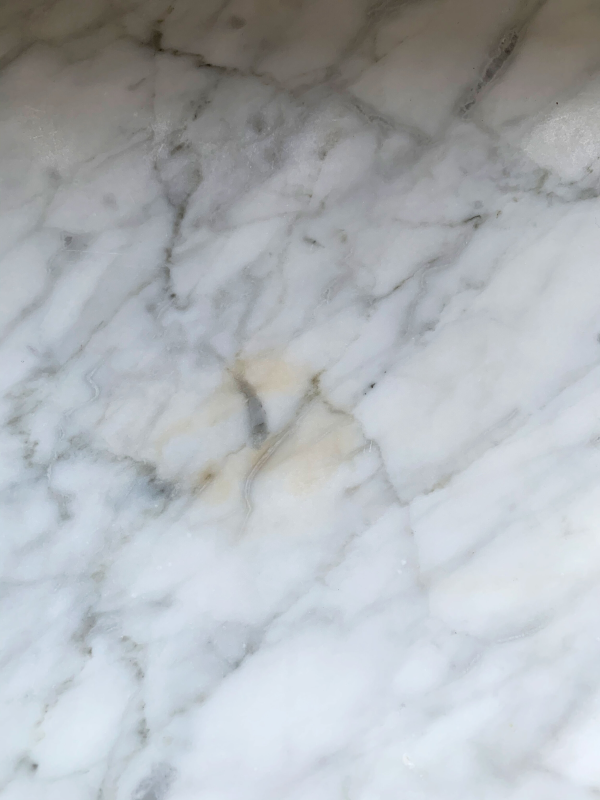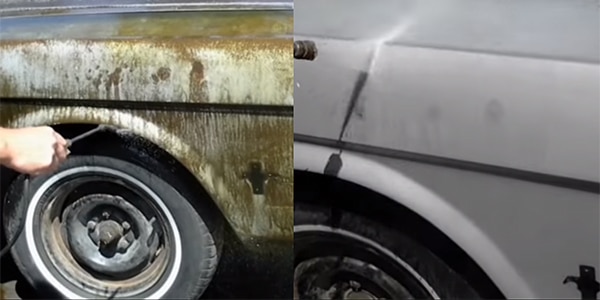Marble is a popular choice for many homeowners and businesses, as it provides a classic and sophisticated look to any room. However, over time, marble surfaces can become stained and discolored, particularly if they are exposed to moisture and acidic substances. One of the most common issues faced by marble owners is rust stains, which can be especially unsightly and difficult to remove.
In this blog post, we will be discussing various methods for removing rust stains from marble surfaces. We’ll cover everything from using simple household items like lemon juice and vinegar, to more advanced techniques like poultice treatments. Our goal is to provide you with the knowledge and tools you need to tackle even the toughest rust stains, so that you can keep your marble looking as beautiful as the day you got it.
So, if you’re tired of looking at those unsightly rust stains on your beautiful marble surfaces, read on! Whether you’re a homeowner, business owner, or simply a DIY enthusiast, this post is for you

Removing Rust Stains From Marble Overview
Let’s start with household items. Using a mixture of lemon juice and salt is a great natural way to remove rust stains. Simply apply the mixture to the stain, let it sit for about 30 minutes, then rinse it off with water. The acid in the lemon juice works to dissolve the stain, while the salt acts as an abrasive to scrub it away. I was really impressed with how well this worked on lighter rust stains.
If you’re dealing with more stubborn rust stains, a poultice treatment might be the way to go. This involves mixing a special absorbent powder with a chemical rust remover, then spreading the mixture over the stain and covering it with plastic wrap. Let it sit for 24-48 hours, then remove it and rinse the surface. I found that this method worked like a charm on even the toughest rust stains.
There are also several commercial rust stain removers available that work well on marble surfaces. I tried a few, and I have to say, they’re all pretty amazing. They’re easy to use, and they get the job done quickly and effectively. Just make sure to follow the instructions carefully and test on a small, inconspicuous area first.
In conclusion, I’m blown away by how effective these methods and products are for removing rust stains from marble surfaces. Whether you opt for a natural solution or a commercial product, you’ll be amazed at the results. So go ahead, give it a try and see the beauty of your marble surface restored!
Removing Rust Stains From Marble In Comparison
Rust stains on marble surfaces can be unsightly and difficult to remove. There are various methods for removing rust stains from marble, including using natural household items, commercial rust removers, or professional cleaning services. In this guide, we will provide a comprehensive analysis of the problem of rust stains on marble, describe different methods for removing the stains, and compare the pros and cons of each method to help you make an informed decision about which method is best for you.
Method 1: Natural Household Items
Using natural household items such as vinegar, lemon juice, or baking soda is one of the most affordable and accessible methods for removing rust stains from marble. Simply mix a solution of equal parts water and vinegar, lemon juice, or baking soda, apply it to the stain, and let it sit for 5-10 minutes before wiping it away with a clean cloth. Repeat the process as needed until the stain is removed.
Pros:
- Affordability: Natural household items are readily available and inexpensive.
- Environmentally friendly: Natural household items are safe for the environment and do not contain harmful chemicals.
Cons:
- May take multiple treatments: Depending on the severity of the stain, it may take multiple treatments to completely remove the rust.
- May cause discoloration: Some natural household items, such as vinegar, can cause discoloration or damage to the marble surface if not used carefully.
Method 2: Commercial Rust Removers
Commercial rust removers are specifically designed to remove rust stains from a variety of surfaces, including marble. Simply follow the instructions on the product label, applying the solution to the stain, and let it sit for the recommended time before wiping it away with a clean cloth.
Pros:
- Ease of use: Commercial rust removers are easy to use and do not require any special equipment or knowledge.
- Effective: Commercial rust removers are specifically designed to remove rust stains and are often effective in a single treatment.
Cons:
- Cost: Commercial rust removers can be more expensive than natural household items.
- Chemical exposure: Commercial rust removers contain chemicals that can be harmful to your skin, eyes, and lungs, so it is important to use them with caution and to follow the instructions on the product label.
Method 3: Professional Cleaning Services
Hiring a professional cleaning service is another option for removing rust stains from marble. Professional cleaners have the knowledge and equipment to safely and effectively remove rust stains from your marble surface.
Pros:
- Expertise: Professional cleaners have the expertise to remove rust stains from a variety of surfaces, including marble.
- Safe: Professional cleaners have the knowledge and equipment to safely remove rust stains without causing damage or discoloration to your marble surface.
Cons:
- Cost: Hiring a professional cleaning service can be expensive, especially if the rust stain is severe.
- Convenience: Hiring a professional cleaning service requires scheduling an appointment, which may not be convenient for everyone.
| Method | Affordability | Ease of Use | Effectiveness | Safety | Convenience |
|---|---|---|---|---|---|
| Natural Household Items | High | Medium | Medium | High | High |
| Commercial Rust Removers | Low | High | High | Low | Medium |
| Professional Cleaning Services | Low | Low | High | High | Low |
In conclusion, there are several methods for removing rust stains from marble, including using natural household items, commercial rust removers, or professional cleaning services. The method that is best for you will depend on your budget
Equipment To Work With Rust Stains Removers From Marble
| Equipment | Description |
|---|---|
| Lemon Juice | A natural ingredient used in the lemon juice and salt method. |
| Salt | Used in combination with lemon juice to form a paste for removing rust stains. |
| White Vinegar | A natural ingredient used in the white vinegar and baking soda method. |
| Baking Soda | Used in combination with white vinegar to form a paste for removing rust stains. |
| Absorbent Powder | Used in the poultice treatment to absorb the rust stain. |
| Chemical Rust Remover | Used in the poultice treatment to dissolve the rust stain. |
| Plastic Wrap | Used to cover the poultice mixture to keep it in place. |
| Commercial Rust Stain Remover | A specialized product used to remove rust stains from marble. |
| Soft Cloth | Used to apply the mixture to the stain and to rinse the surface. |
| Water | Used to rinse the surface after removing the stain. |
Note: It is recommended to use a soft cloth to avoid scratching the marble surface and to test any chemical products on a small, inconspicuous area first.

Step-by-Step Guide for Removing Rust Stains from Marble
- Gather your materials. You will need lemon juice, salt, white vinegar, baking soda, absorbent powder, chemical rust remover, plastic wrap, a commercial rust stain remover, a soft cloth, and water.
- Test the solution on a small, inconspicuous area of the marble surface to make sure it won’t cause damage or discoloration.
- For the lemon juice and salt method, mix equal parts lemon juice and salt to form a paste. Apply the paste to the rust stain and let it sit for 15 minutes. Then, rinse the area with water and dry with a soft cloth.
- For the white vinegar and baking soda method, mix equal parts white vinegar and baking soda to form a paste. Apply the paste to the rust stain and let it sit for 15 minutes. Then, rinse the area with water and dry with a soft cloth.
- For the poultice treatment, mix a small amount of absorbent powder and chemical rust remover to form a paste. Apply the paste to the rust stain, cover with plastic wrap, and let it sit for 24 hours. Then, remove the plastic wrap and rinse the area with water and dry with a soft cloth.
- For the commercial rust stain remover, follow the instructions on the product label. Usually, this involves applying the product to the stain and letting it sit for a specified time before rinsing the area with water and drying with a soft cloth.
- Repeat the process if necessary.
Note: Always wear gloves and protective eye gear when using chemical rust removers. Do not mix different products, as this can be dangerous and cause damage to the marble surface.
F.A.Q.
What are the causes of rust stains on marble?
Rust stains can occur on marble surfaces due to the presence of iron or steel objects, such as tools or metal furniture, that have come into contact with moisture and have begun to corrode.
Can I use acidic solutions, such as vinegar or lemon juice, on my marble surface?
Yes, you can use acidic solutions, such as vinegar or lemon juice, to remove rust stains from marble. However, it is important to test the solution on a small, inconspicuous area first to make sure it won’t cause damage or discoloration.
Is it safe to use chemical rust removers on my marble surface?
Chemical rust removers can be safe to use on marble surfaces, but it is important to follow the instructions on the product label and to wear gloves and protective eye gear when using the product. Additionally, it is recommended to test the product on a small, inconspicuous area first to make sure it won’t cause damage or discoloration.
Can rust stains be removed completely from my marble surface?
Rust stains can often be removed completely from a marble surface, but it may take multiple treatments and the results may vary depending on the severity of the stain and the type of marble surface.
Is it possible to prevent rust stains from forming on my marble surface?
To prevent rust stains from forming on your marble surface, it is important to keep metal objects, such as tools or metal furniture, away from the marble surface and to clean up any spills or stains promptly.


Leave a Reply